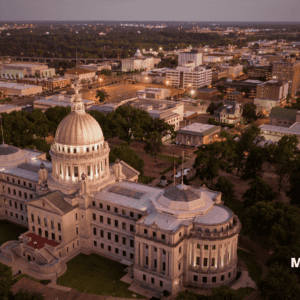It’s the same routine every four to eight years. A new president comes in, follows through on some promises, blames the opposing party for gridlock, and passes the torch to his successor. And with this routine, another constant: our problems, too, remain unsolved.
In 2020, that list of problems is growing. The country is facing a once-in-a-lifetime pandemic, a shattered economy, skyrocketing unemployment, and a divided public that can only agree on hating the other side. A new president is unlikely to solve the problems that matter to Americans most.
Why then, do we continue to look to Washington, DC, for answers? The solution to these problems lies within us, in our states and communities. Americans agree. According to the Pew Research Center, the majority of Americans believe the prescription to our country’s problems begins with neighborliness. It’s in our schools, libraries, churches, and civic organizations that we can rebuild interpersonal relationships and work together to solve problems. Success in one community will spread to the next, and eventually work its way up to the national level. As solution centers that are tapped into their local communities, state think tanks can play a big role in helping their states recover and grow.
Although most attention focused on the presidential election, hundreds of state contests took place last week. Below are key takeaways from the state elections and opportunities for state think tanks in this shifting policy landscape.
State Legislatures
- Overall, most state chambers stayed the same. The only flip so far has been New Hampshire where both chambers moved from Democratic control to Republican control. Both Alaska and Arizona are still counting votes, and both expect at least one chamber to flip. Since this is a redistricting year, this is significant, as state lawmakers will draw the lines for the next 10 years.
- Several states expanded Republican majorities: Florida, Texas, Iowa, Ohio, and Kansas.
- Millions of dollars were spent on attempts to flip the Texas House, the Minnesota Senate, the Michigan House, both North Carolina chambers, and the Georgia House. These efforts were unsuccessful, with Republicans either maintaining or gaining seats.
- For now, Minnesota remains the only state in the union with legislative chambers from two different parties.
- In Nevada, Republicans are no longer a super minority, enabling them to have more of a voice.
Trifectas and governors
- As of November 10, 2020, there are 23 Republican trifectas, 15 Democrats trifectas, and 12 divided governments.
- Republicans gained a trifecta in Montana and New Hampshire. Alaska is likely to also move to a Republican trifecta but this is not confirmed. Republican trifecta states now include: Alabama, Arizona, Arkansas, Florida, Georgia, Idaho, Indiana, Iowa, Mississippi, Missouri, Montana, Nebraska, New Hampshire, North Dakota, Ohio, Oklahoma, South Carolina, South Dakota, Tennessee, Texas, Utah, West Virginia, and Wyoming.
- Democrats gained no trifectas. Democrat trifecta states are: California, Colorado, Connecticut, Delaware, Illinois, Maine, Nevada, New Jersey, New Mexico, New York, Oregon, Rhode Island, Virginia, and Washington.
- Before the 2020 election, there were 24 Democratic governors and 26 Republican governors. Now, there are 23 Democratic governors and 27 Republican governors.
Opportunities for states and state think tanks
With Joe Biden moving closer to the presidency, along with Democrats retaining control of the House and possibly taking over the Senate, states’ policy decisions will be more important than ever. States have an opportunity to show a different path—one that emphasizes the benefits of working with communities to solve problems at the state and local levels.
Jobs and the Economy
As Americans have felt their personal economic situations worsening, jobs and the economy because top issues for voters. Nearly half of voters think a free-market economy is the best path to recovery and growth, so state think tanks have an extraordinary opportunity to champion these types of solutions in the year ahead.
Healthcare
With nationalized healthcare being a clear priority for a potential Biden administration, the Network’s healthcare solutions are all the more important. Americans are increasingly open to free-market solutions for healthcare: A majority of Americans think we should replace or fix the Affordable Care Act whereas only one in five think universal government healthcare is the way to go. States can make healthcare more accessible and affordable by deregulating healthcare in statute and telling the story of how this deregulation helps people get better care faster, more cheaply, and with a better patient experience.
Education
States have historically had more oversight over education, and there will continue to be opportunities in this area, especially as our communities adapt to pandemic-related disruptions in education. States can support families and students by encouraging innovative solutions like learning pods and making sure students have internet access for distance learning. For state think tanks and their communities, local engagement and coalition building will be important keys to creating more of the options that parents are showing interest in.
What we learned from the voters
SPN partnered with Heart+Mind Strategies to conduct a poll on Election Day and learn what concerns and values ultimately factored into Americans’ voting decisions. While most voters filled out their ballots by party line, polling revealed a few insights that Network think thinks should bear in mind while setting 2021 strategies:
- Coalitions are shifting. Trump picked up favor among Hispanics and some African Americans, but he lost some ground among whites, both college-educated and those without degrees. This break creates an interesting setup in rural conservative states with minority-heavy inner cities. As Republicans and Democrats fight for those votes, the state level dynamic changes.
- Republican voters showed more concern over the economy and creating jobs. Setting aside the government’s response to the coronavirus, healthcare continues to be the biggest concern for Democrats. It’s a concern worth noting because Democrats had supposedly fixed healthcare with the passage of the Affordable Care Act. With so many Americans dissatisfied with the solution their party has put forward, these voters may be signaling an openness to alternative, market-centered reforms.
- Democrats are also concerned about issues connected to race and racial equality. But at the same time, 52 percent of people in this exit polling said their preference for dealing with racial inequality is to get back to a system that has racially blind equality of opportunity.
- Almost 80 percent of voters said groups need to work together to find common ground. There’s real hunger, especially after the last four years, for institutions to focus on bringing people together. For state think tanks, this is an opportunity to focus on consensus building rather than aggressive messaging and to serve their communities as a trustworthy, solution-oriented resource.
See more insights from our election polling.
More on the Election:



